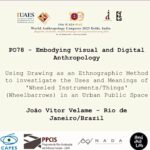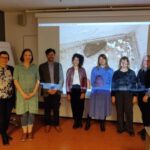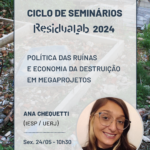The “Waste and city videos series” is the result of an institutional partnership between Amsterdam University College (AUC), Interdisciplinary Social Science (UU) and the Laboratory of Social Studies of Waste – ResiduaLab/ UERJ. In June 2023, the Urban Anthropology Lab (UAL), an intensive course coordinated and ministered by Prof. Dr. Roy Gigengack, was held in Amsterdam, with a lecture by Maria Raquel Passos Lima. This collaboration led to the production of a series of videos addressing urban issues related to waste and the city of Amsterdam through visual anthropology.
Throughout this post, you’ll find all the videos in the series, which will be added to as they are released.
***
O ResiduaLab inaugura a série de vídeos “Waste and city”, resultado de uma parceria institucional entre a Amsterdam University College (AUC), a Interdisciplinary Social Science (UU) e o Laboratório de Estudos Sociais de Resíduos – ResiduaLab/ UERJ.
Em junho de 2023, foi realizado em Amsterdã o Urban Anthropology Lab (UAL), curso intensivo coordenado e ministrado pelo Prof. Dr. Roy Gigengack, com participação de Maria Raquel Passos Lima. Essa colaboração levou à produção de uma série de vídeos abordando questões urbanas relacionadas a resíduos e à cidade de Amsterdã por meio da antropologia visual.
Ao longo dessa postagem, você encontra todos os vídeos da série, que serão adicionados conforme são lançados.
#1
The video #1 was created by Manoela Rutigliano.
Synopsis
Inspired by the work of Maria Raquel Passos Lima, this short film presents urban and anthropological research through the question “what is garbage?”. This analysis is then explored through visual evidence of the presence of random objects that are discarded in bicycle baskets in Amsterdam. Based on these observations, Rutigliano presents a reflection on the process in which these objects gain the power to disgust and therefore become garbage. In this way, being trash is understood as a contextually and phenomenologically acquired state rather than an inherent condition.
Who is Manoela Rutigliano?
I’m from São Paulo, but now I live in Amsterdam. I’m studying anthropology, sociology and visual culture at Amsterdam University College. I have a strong academic interest in art, culture and curating.
Vídeo #1 é de Manoela Rutigliano
Sinopse
Inspirado no trabalho de Maria Raquel Passos Lima, este curta apresenta uma pesquisa urbana e antropológica através da pergunta “o que é lixo?”. Essa análise é então explorada por evidências visuais da presença de objetos aleatórios que são descartados em cestas de bicicletas em Amsterdam. A partir dessas observações, Rutigliano apresenta uma reflexão sobre o processo em que esses objetos obtêm o poder de enojar e, portanto, tornam-se lixo. Desta maneira, ser lixo é entendido como um estado adquirido contextual e fenomenologicamente ao invés de uma condição inerente.
Quem é Manoela Rutigliano?
Sou de São Paulo, mas agora moro em Amsterdã. Sou estudante de antropologia, sociologia e cultura visual na Amsterdam University College. Tenho um grande interesse acadêmico no meio artístico, cultural e curatorial.
#2
The video #2 was created by Lina Schirmer.
Synopsis
In a pioneering move, Amsterdam committed to a circular economy in 2020, aiming to eradicate waste and promote sustainability. By 2030, they plan to halve new raw material use, striving for full circularity by 2050. While concealing waste with underground containers, you are confronted with biases surrounding waste, challenging perceptions and shedding light on the reality behind urban sustainability.
Who is Lina Schirmer?
With an academic background in anthropology and international relations, I, Lina Schirmer, am currently a master’s student in Sustainable Urban Planning and Design at KTH Royal Institute of Technology. Last semester, I participated in the course Urban Anthropology Lab at Amsterdam University College, where I was able to work on this short clip. Growing up in different cities and countries such as the UK and UAE, I have always found researching and examining urban environments and their underlying structures extremely interesting and important, and this is a field that will become increasingly vital as the global trends of urbanisation increase.
#3
The video #3 was created by Anne-Moon Baas.
Synopsis
Walking the streets around Amsterdam-Oost, one can observe patterns of how people treat the idea of waste. This video touches upon how the binary between product and waste is conceived around the Dappermarkt area. A product always “belongs” to someone. It either belongs to the seller, or the buyer. Once someone discards of a product, and decides that it becomes a waste, everyone else seems to agree, as it does not belong to them either. Therefore, it is not the quality or use of a product that determines when it becomes a waste, but rather it is a social rule that is established by one, and followed by others. However, the video also found another emerging category of waste, which is repurposed waste. Either you can get something in return for the waste, such as money, or you can reuse it, assigning it a new purpose. This resourceful approach to waste should be encouraged, and it poses some innovation to the future of waste.
Who is Anne-Moon Baas?
My name is Anne-Moon Baas. I come from a Dutch harbour town which is known for having one of the biggest steel factories in the world, so I developed an interest in waste and pollution at an early age. I am currently a third-year student at Amsterdam University College, studying anthropology and sustainability.
#4
The video #4 was created by Aaron van Blerkom.
Synopsis
Using footage collected while living in Amsterdam and Belgrade, the video shows waste at the margins of the city. This waste becomes invisible to most people during their everyday lives, but it is actually everywhere. Using a montage and snippets of newscasts about waste, the video is a poem about our addiction to disposable consumer goods.
Who is Aaron van Blerkom?
My name is Aaron van Blerkom. I did my bachelors at Northeastern University and Amsterdam University College in International Affairs, minoring in Linguistics and German. Through my global background and interdisciplinary studies, I have developed a passion for creating change ranging from global politics to the local community.



